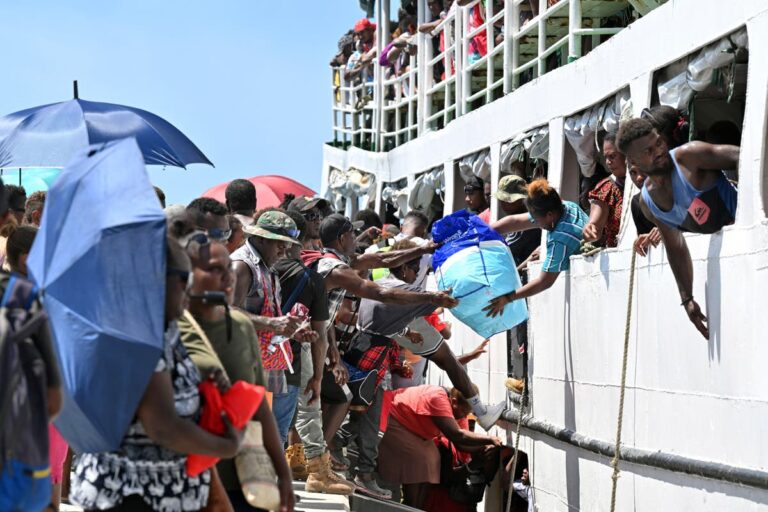
[ad_1]
The country in which China has gained most influence in the South Pacific, Solomon Islands, goes to the polls on Wednesday in an election that could shape the region’s future.
Current Prime Minister Prime Minister Manasseh Sogavare, who switched the Solomons’ allegiance from Taiwan to Beijing and ignited fears of China gaining a naval foothold in the South Pacific, is seeking an unprecedented second consecutive term at the government’s helm.
Even if Sogavare fails, observers suspect China will be backing more than one pro-Beijing candidate in the murky contest for the Solomons’ top job in an effort to cement Beijing’s growing influence.
There are also fears the electoral process could again ignite violence in a restive nation riven with inter-island and ethnic tensions, a perceived lack of sharing of resources, widespread poverty and high youth unemployment.
Here’s what you need to know about the election:
HOW DO ELECTIONS IN SOLOMON ISLANDS WORK?
Voters from among 700,000 people spread over the more than 900 islands that comprise the Solomon Islands will elect 50 lawmakers from 334 candidates. Only 21 candidates are women and none of them is currently in office. The only two women in the current parliament won’t contest the election.
The 50 newly elected lawmakers then decide which of them will become prime minister. No political party ever wins the 26-seat majority needed to form a government in a system derived from the former British colonial masters’ Westminster system.
The eve of the election is known as Devil’s Night when candidates and their campaign teams are notorious for resorting to underhand means to skew results in their favor such as by buying votes. That can take the form of paying voters’ transport costs to get home to electoral districts where they’re registered to vote, offers of cash for the promise of a vote or paying influential local leaders to voice support.
Ballots are supposed to be cast in secret but there is apparently enough doubt about the integrity of the system to sustain the practice of vote buying and discourage voters from reneging on their promises to vote for the candidates who paid them.
After the election, lawmakers form camps around hotels in the capital Honiara where horse trading takes place to persuade a majority to back various candidates for prime minister. Ministerial posts are offered as inducements. Foreign business figures from the mining, logging, retail and tourism industries also take part in negotiations, fueling concerns lawmakers might put personal gain ahead of constituents’ interests.
Sogavare was sworn in three weeks after the 2019 election date.
WHO IS THE INCUMBENT PRIME MINISTER?
Sogavare has been made prime minister four times and hopes to become the first prime minister to gain a second consecutive term in the Solomons’ 12th parliament since independence in 1978.
The 69-year-old karate blackbelt has been variously described as intelligent, self-serving, a nationalist and mercurial.
The former bureaucrat first came to power in 2000 when he replaced Prime Minister Bartholomew Ulufa’alu who had been kidnapped by a rebel militia and resigned from office in exchange for his freedom. Sogavare remained in power for 17 months before he was replaced in the 2001 election.
Riots following the 2006 election, which were fueled by allegations of Chinese interference and resentment against Chinese business people, led to Prime Minister Snyder Rini’s resignation after a week in office and Sogavare’s second 18-month stint as government leader.
Sogavare’s third stint started at the 2014 election but he was ousted by lawmakers three years later with a no-confidence vote.
BACKGROUND TO THE 2024 ELECTION
Sogavare’s rule since the 2019 election has been his longest stretch in power and his five-year administration has been transformative.
He swung the Solomons from Taiwan to Beijing in 2019, five months after taking power and shocked the United States and its allies by signing a security pact with Beijing in 2022.
While the agreed upon document has not been made public, a leaked draft would involve China in maintaining civic order through the deployment of “armed police, military personnel and other law enforcement and armed forces.”
Sogavare delayed the election, which was due last year, through an act of parliament because he argued the country couldn’t afford to hold the poll and host the regional Pacific Games in the same year
His critics called he called he move a power grab. Sogavare accused Australia of “an assault on our parliamentary democracy” for offering to carry the cost of the election so that it could go ahead as scheduled in 2023.
He may also have China to thank for his continued leadership, with Australian Broadcasting Corp. reporting that China provided more than $3 million to bribe lawmakers to support Sogavare against a no-confidence motion in parliament in 2021. Sogavare’s government denied the report.
Sogavare’s latest term has also been marred by COVID-19 and rioting that led to the return of Australian peacekeepers in 2001.
Sogavare’s election sparked riots in Honiara in early 2019 over legal questions hanging over his eligibility to become prime minister. More severe riots resulted in arson and looting in Honiara in November 2021 after his leadership survived the no-confidence motion.
In later 2021, Sogavare invited Australian police to help restore order under a 2017 bilateral security treaty that provides a legal basis for the deployment of Australia police, troops and associated civilians in the event of a major security challenge.
[ad_2]
Source link
